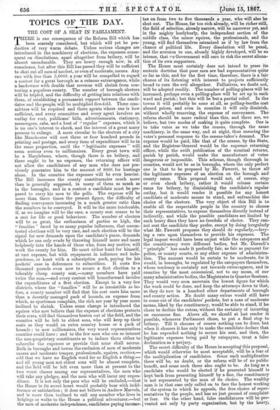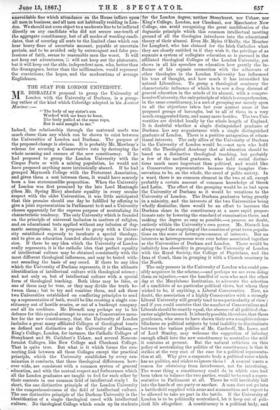TOPICS OF THE DAY.
THE COST OF A SEAT IN PARLIAMENT. THERE is one consequence of the Reform Bill which has been scarcely considered, but which will yet be pro- ductive of very warm debate. Unless serious changes are introduced in the machinery of elections, the expenses conse- quent on dissolutions, apart altogether from bribery, will be almost unendurable. They are heavy enough now, in all conscience, but after this Bill has passed they will be sufficient to shut out all men of modest, or even of moderate, means. Any one with less than 5,0001. a year will be compelled to regard a contest for a great borough as a ruinous extravagance, while a landowner with double that revenue will shrink from con- testing a populous county. The number of borough electors will be tripled, and the difficulty of getting into relations with them, of establishing a permanent rapport between the candi- dates and the people, will be multiplied five-fold. Three com- mittees will be required and three agents where one is now sufficient, and every committee and every agent involves an outlay for rent, publicans' bills, advertisements, stationery, messengers, cabs, and a host of " regular " expenses, which it is no one's interest to check, and the interest of a great many persons to enlarge. A mere circular to the electors of a city like Manchester will cost three or four hundred pounds in printing and postage, and every item of expenditure will be in the same proportion, until the " legitimate expenses " will seem serious even to millionaires. Every great town will be a Marylebone, where, though there is no bribery, and there ought to be no expenses, the returning officer will not allow the candidature of any man who does not pre- viously guarantee him to the amount of 8001. for hustings alone. In the counties the expenses will be even heavier. The Bill increases the county constituencies much more than is generally supposed, in many of them as much as in the boroughs, and in a contest a candidate must be pre- pared to carry his men to the polls. The expense will be more than three times the present figure, the difficulty of finding conveyance increasing in a much greater ratio than the numbers to be conveyed. It will be the more intolerable, if, as we imagine will be the case, a county seat ceases to be a seat for life or good behaviour. The number of electors will be so great, the enthusiasm of parties so high, the " families " faced by so many popular influences, that uncon- tested elections will be very rare, and each election will be the signal for new demands upon the candidate's purse, demands -which he can only evade by throwing himself more ana more helplessly into the hands of those who, from any motive, will work the county for him. He must either hunt for himself, at vast expense, but with repayment in influence and inde- pendence, or hunt with a subscription pack, paying for his pockets' ease in deferences to subscribers. It costs five thousand pounds even now to secure a first election to a tolerably cheap county seat,—many members have paid twice the sum,—and every contest will henceforward involve the expenditures of a first election. Except in a very few districts, where the "families" will be as irresistible as be- fore, a county member will find that his seat costs him more than a decently managed pack of hounds, an expense from which, as sportsmen complain, the rich are year by year more inclined to shrink. Unless some change is introduced the squires who now believe that the expense of elections protects their seats, will find themselves beaten out of the field, and the counties will be left to eldest sons, who will keep up their, seats as they would an extra country house or a pack of hounds ; to new millionaires, the very worst representatives counties could have ; and to the few men who can so interest the non-proprietary constituents as to induce them either to subscribe the expenses or provide that none shall accrue. Both in boroughs and towns the exclusion of men of moderate means and moderate temper, professionals, squires, rentiers,— odd that we have no English word for so English a thing,— and all young men not eldest sons will be almost complete, and the field will be left even more than at present to the two worst classes among our representatives, the, men who will take any pledge, and the men who will incur any expen- diture. It is not only the poor who will be excluded,—that the House in its secret heart would probably bear with indif- ference or satisfaction ; it does not believe in Andrew Marvels, and is more than inclined to call any member who lives in lodgings or walks to the House a political adventurer,—but the men of moderate independence, candidates paying income- tax on from two to five thousands a year, who will also be shut out. The House, far too rich already, will be richer still, the field of selection, already narrow, will be narrower yet, and in the mighty hurlyburly, the independent section of the middle class, the minor squires, the professionals, and the young, will find themselves ostracized as if by law from the. chance of political life. Every dissolution will be penal,. and the aversion to one, already highly developed, will be so. intense, that ro Government will care to risk the secret aliena- tion of its own supporters.
The House most certainly does not intend to press its. esoteric doctrine that poor men are bad representatives quite so far as this, and for the first time, therefore, there is a fair chance of its listening with interest to projects sufficiently broad to cure the evil altogether. Palliatives, we doubt not, will be adopted readily. The number of polling-places will be increased, perhaps even a polling-place will be set up in each ward and parish ; but this will be but a partial relief. In the towns it will probably be none at all, as polling-booths cost absurd prices, and even in counties it will only diminish, without wholly removing, the expense of conveyance. The reform should be more radical than this, and there are, we believe, but two modes of making it quite complete. One is to take votes as we take the census, through the same machinery, in the same way, and at night, thus ensuring the voter's personal response to the census-taker's demand. The- expense would be paid, like that of the census, by the State, and the Registrar-General would be the supreme returning- officer, while the swift publication of the nominal returns, parish by parish, would make the manufacture of votes: dangerous or impossible. This scheme, though thorough in counties, would not be so in boroughs, where the only perfecb one is that to be proposed by Mr. Fawcett, to throw all' the legitimate expenses of an election on the borough an county rates. This proposal would not, of course, stop- or even check bribery, rather it would release certain sums for bribery, by diminishing the candidate's regular outlay, but it would render it possible for any honest candidate of moderate means to stand, and enfranchise the- choice of the electors. The very object of this Bill is to enable all the respectable people in the country to choose- their representatives, to express themselves directly instead of indirectly, and while the possible candidates are limited by- such heavy fines they have no freedoin of choice. They can- not seat the candidate they prefer, except by doing irregularly what Mr. Fawcett proposes they should do regularly,—levy- ing a rate upon themselves to provide his expenses. The- legal impost would have been unjust while the ratepayers and the constituency were different bodies, but Mr. Disraeli's " principle " has made it perfectly fair, as fair as payment for- police, or county courts, or any other expense of administra- tion. The amount would be certain to be moderate, for it would, in boroughs, be regulated by the ratepayers themselves, whose tendency is certainly not towards extravagance, and in counties by the most economical, not to say mean, of our- many administrative bodies, the Magistrates in Quarter Sessions_ Theywould very soon ascertain the lowest figure for which. the work could be done, and keep the attorneys down to that, as they do now in a hundred other departments of borough, and county action. No doubt many extras would still have to come out of the candidates' pockets, but a man of moderate means, liked by the constituency, would be able to stand, if he- chose to decline the extras, without the certainty of incurring an enormous fine. Above all, we should at last render it possible, whenever Parliament chose, to put a final stop to- bribery. Till it chooses of course nothing can be done, but when it chooses it has only to make the candidate declare that he has expended nothing to secure his seat, and then, the legitimate expenses being paid by ratepayers, treat a false declaration as a -perjury. The secret difficulty of the House in accepting this proposal, which would otherwise be most acceptable, will be a fear of the multiplication of candidates. Some such multiplication there will be, no doubt, or the reform will be of no public- benefit, and some such there also ought to be. As long as a candidate who would be elected if he presented himself is• kept back from presenting himself by a fine, the constituency is not represented by the man of its choice. The wealthy man is in that case only called on to face the honest working- of the system to which he appeals, the free choice of repre- sentatives by the people, and has no just ground of complaint or fear. On the other hand, false candidatures will be pre- vented not only by party organization, but by the heavy, unavoidable fine which atteridaice on the Hoiss; inflicts upon all men in business, and all men not habitually residing in Lon- don. We should not'even object to a moderate fine to be inflicted
ectly on any candidate who did not secure one-tenth of the aggregate constituency, but of all modes of weeding candi- dates, that of securing all seats to the limited class which can bear heavy fines of uncertain amount, payable at uncertain periods, and to be avoided only by extravagant and false pro- fessions of faith, seems to reasonable men the worst. It will not keep out adventurers, will not keep out the plutocrats, but it will keep out the able, independent men, who, better than the demagogues, better than the millionaires, would represent the convictions, the hopes, and the moderations of average Englishmen.































 Previous page
Previous page